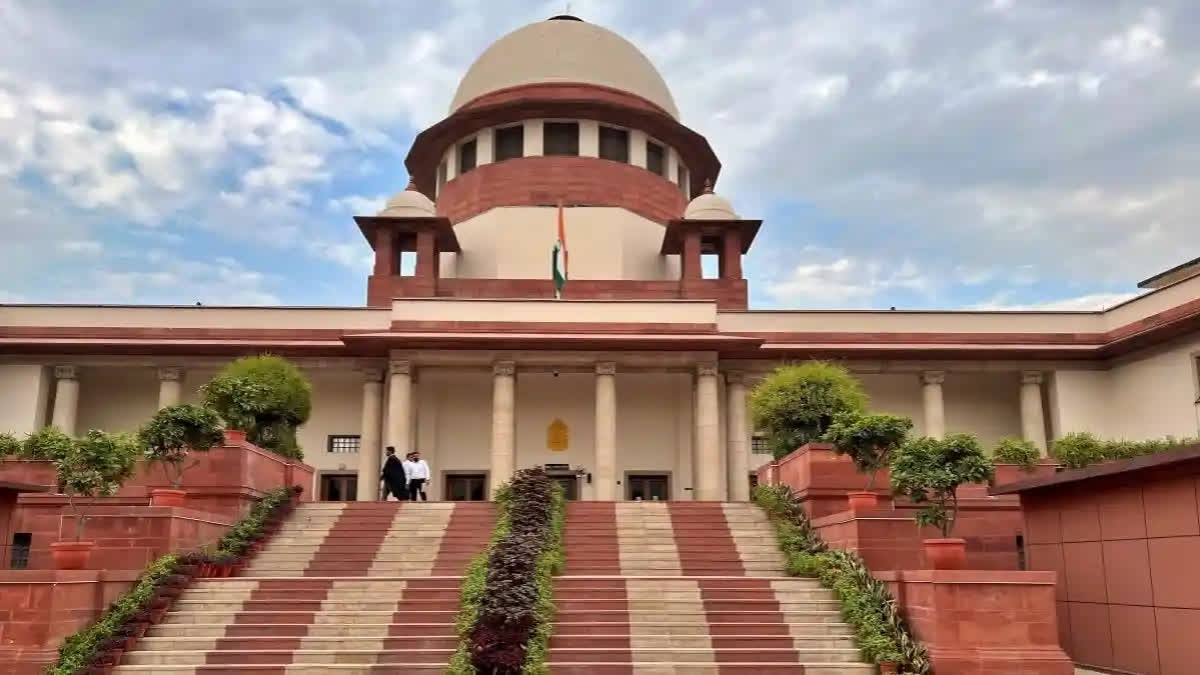New Delhi: The Supreme Court on Monday told Tamil Nadu government counsel that state or its officers should help the Enforcement Directorate (ED) for finding out if any offense is made out against any person, and emphasized that state has to comply with laws enacted by the Parliament, while continuing to ask why state is aggrieved in the matter.
“If the state machinery is asked to help, what is the prejudice caused?”, the apex court told the state government counsel. At the outset, a bench comprising Justices Bela M Trivedi and Pankaj Mithal asked senior advocate Kapil Sibal and additional advocate general Amit Anand Tiwari, representing the Tamil Nadu government, if district collector was aggrieved, he could have moved the court in individual capacity, and queried, but how is state aggrieved?
Sibal asked, "Is he (collector) not part of the state?" Justice Trivedi said Under Article 256 of the Constitution, states have to comply with central laws and cited the enactment of Prevention of Money Laundering Act by the Parliament. Sibal said mining is not a scheduled offence.
On February 23, the Supreme Court questioned the Tamil Nadu government challenging summonses issued to five district collectors by the ED in connection with a money-laundering case. The summonses were issued in connection with the ED's probe into an alleged illegal sand mining scam in Tamil Nadu.
On Friday, the apex court had asked the Tamil Nadu government counsel how the state can file writ petition against ED? Senior advocate Mukul Rohatgi, representing the Tamil Nadu government, had said it can.
During the hearing on Monday, Sibal said there are no proceeds of crime pending in any FIR, no predicate offense in any FIR qua which information is sought. Justice Trivedi queried for issuance of Section 50 summonses there has to be a predicate offense. Sibal said there is none here and they are asking information for something for which there is no predicate offence, therefore the question of summons does not arise.
Sibal said the ED is concerned with money laundering and it cannot investigate a predicate offense as it has no power under PMLA to investigate a predicate offense. “Now, in this case the state is filing a writ petition because the authority of the state has been asked to produce documents in respect of leases qua which is no scheduled offence (in connection with sand mining)….”, said Sibal.
Justice Mithal said “the state or its officers, they should help the ED for finding out any offence is made out against any person”. Sibal, opposing the observation made by the bench, said then your lordships may say ED can investigate anywhere in this country.
Citing the apex court judgment in Vijay Madanlal Choudhary case, Sibal said if it is a predicate offence only then the ED can investigate, so where is that predicate offence here. “If the state machinery is asked to help, what is the prejudice caused?”, asked justice Mithal.
Sibal said there is provision 66(2) of PMLA, the ED is investigating any offence in the course of which it finds information with the commission of a predicate offence, it sends the documents to the investigating authority of the state, and not the other way around.
Sibal stressed ED cannot say please give us information of some offence that is not the jurisdiction of the ED and they are asking information from an authority of the state and the state is aggrieved and the authority (district collector) is also aggrieved, and what is the legal basis of saying that the state cannot file the writ petition. “That is our query”, said the bench.
Sibal said there should be a formal notice so that the state can file an affidavit, and the matter is listed before high court in March first week, and added, “anyway your lordships have already determined, your lordships may decide. It is quite clear!” Justice Trivedi told Sibal, “it is up to you whether you argue or not…we issue notice and we will see…”.
Additional solicitor general S V Raju, representing the ED, argued that according to Supreme Court rules there is no need for notice to a caveator and in the previous hearing Rohatgi appeared for the state government and sought time, which was provided by the court.
“My learned friend saying notice to be issued, is being unfair to this court”, said Raju. Sibal said we have filed the caveat. Raju drew court’s attention on the FIR and the predicate offence is under Section 120B read with 420, and if there is a predicate offence of conspiracy are we not entitled to investigate, what is there in that conspiracy, proceeds of crime etc.,
“We are investigating the proceeds of crime and looking at the attitude of the state, it appears state want to protect the accused persons…the state is stepping into the shoes of the accused and trying to prevent information….simple innocuous information being asked….we are not investigating any predicate offence”, said Raju, adding that the ED asked the police for information.
After hearing submissions, the bench said the senior counsel appearing for respondents on caveat has submitted that a short counter-affidavit on preliminary issue relating to maintainability has to be filed and let it be placed on record. The apex court has scheduled the matter for further hearing on Tuesday.
The alleged illegal sand mining scam has brought five district collectors of Tamil Nadu under the scanner, with the ED issuing summons to them. After the state government filed a writ petition challenging the summons, the ED requested the Supreme Court to halt the interference.
Read More
Why State Filed Petition against ED Summonses to District Collectors: Supreme Court to TN



